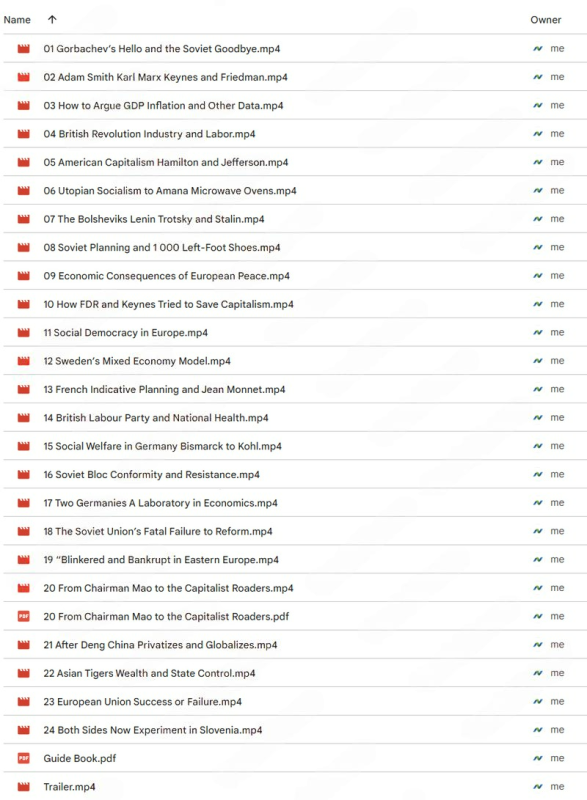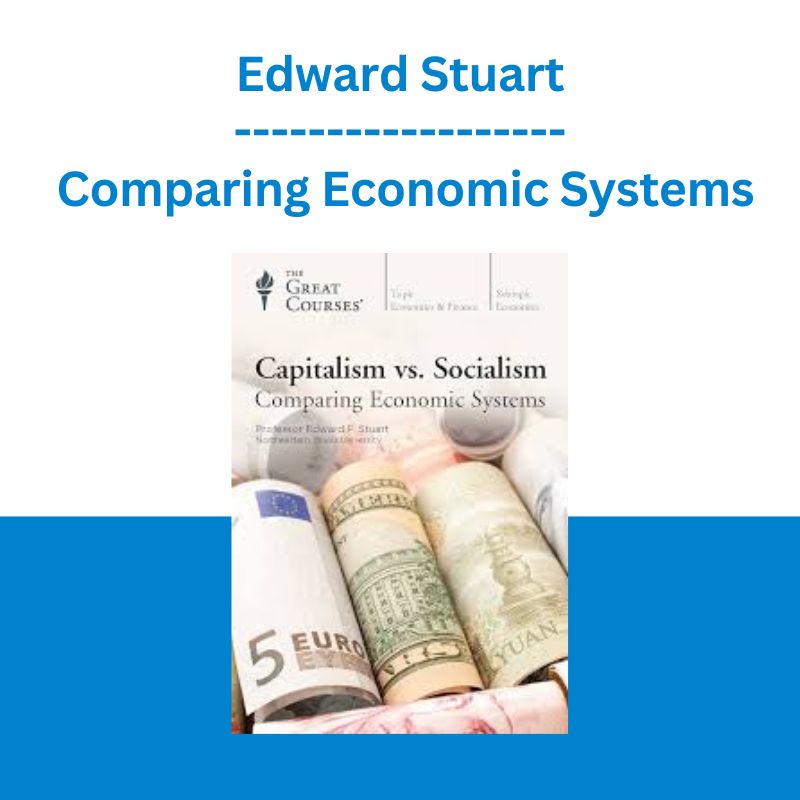*** Proof of Product ***

Exploring the Essential Features of “Capitalism vs Socialism – Comparing Economic Systems – Edward Stuart”
Professor Emeritus Edward F. Stuart takes you across three centuries to chart the history of modern economic thought and practice around the world.
LECTURE (24)
01:Gorbachev’s Hello and the Soviet Goodbye
Begin your foray into comparative economics with a look at the USSR in the final few years before its collapse and the restructuring known as perestroika, which led to an increased interest in the study of capitalism versus socialism in the U.S. Examine some of the major questions that shape economic systems and close with a brief overview of the goals and scope of the course.
02:Adam Smith, Karl Marx, Keynes, and Friedman
Meet four of the most influential economic thinkers in history: Adam Smith, Karl Marx, John Maynard Keyes, and Milton Friedman. As you examine their individual philosophies and influences across three centuries, you may be surprised by how many of their ideas overlap even as their philosophies differ.
03:How to Argue GDP, Inflation, and Other Data
From GDP and inflation to unemployment and standard of living, there is no one absolute measurement that determines the health of an economy. Get an overview of the different metrics for economic success and a general understanding of how they are calculated and interpreted—and why these data points can start more arguments than they resolve.
04:British Revolution: Industry and Labor
Travel to the birthplace of industrial capitalism: Great Britain in the 18th and 19th centuries. A fortuitous meeting of politics, technology, and economics would shape the future and give the world innovations like insurance, corporate ownership and investment, and extended payment systems. It would also inspire writers like Charles Dickens to reveal the horrifying social repercussions of unregulated industrialization.
05:American Capitalism: Hamilton and Jefferson
Modern capitalism may have been born in England, but America would be defined by it from the very beginning. Look at some of the paradoxes inherent in free market systems and how Protestant religious philosophy played a significant part in the direction of the economy. Then, see how founding figures like Hamilton and Jefferson set the course for American economic dominance in the years to come.
06:Utopian Socialism to Amana Microwave Ovens
The many opportunities and innovations of capitalism in the U.S. did not come without a cost. Religious and political thinkers alike turned to new solutions to alleviate the often horrible conditions many workers experienced, resulting in socialist projects that fell into two camps: utopian and scientific. Close with a look at the difficulties inherent in running socialist systems in a largely market economy.
07:The Bolsheviks: Lenin, Trotsky, and Stalin
Why was Soviet communism doomed to failure? Beginning with the Bolshevik revolution, witness the birth and troubled development of communism in a country that was spectacularly ill-equipped to start a government from scratch. See why Marx never envisioned communism taking root in an illiterate, agrarian society and how the lack of economic experience in Soviet leadership created a spiral of disasters.
08:Soviet Planning and 1,000 Left-Foot Shoes
Examine the ways Stalin sought to exercise complete control of the Soviet economy, focusing on his Five-Year Plan for production— an object lesson in the complexities of anticipating and satisfying the material needs of a society. Professor Stuart also gives you an eye-opening look at the ways economics and politics can feed off of one another. Or, in this case, starve each other.
09:Economic Consequences of European Peace
The end of World War I illustrates one of the iron laws of capitalism: upheavals in one part of the world have repercussions all around it. Understand how the Treaty of Versailles set up harsh terms for a depleted Germany and why shortsighted leadership from the Allied powers led to economic fallout and, eventually, the second World War.
10:How FDR and Keynes Tried to Save Capitalism
Was the stock market crash of 1929 the cause of the Great Depression? Find out why Black Tuesday was actually a symptom rather than a cause and trace the origins of the Depression in the U.S. to events and policies of the 1920s, both domestic and international. Then, look at the ways FDR applied the ideas of John Maynard Keynes to help America recover from economic devastation.
11:Social Democracy in Europe
In the wake of economic and social turmoil in the 19th century, some European countries sought to reform the capitalist system and make it more sustainable. Examine the different motives behind the reforms, understand the differences between public and private goods, and compare and contrast the myriad ways economies can blend capitalism and socialism.
12:Sweden’s Mixed Economy Model
Called “The Third Way” by some economists, the economic system of Sweden is perhaps the best example of a philosophy that falls between the extremes of free market capitalism and government-controlled socialism. Professor Stuart explains the many factors that have contributed to Sweden’s relative economic success and what it can teach us about mixed economies.
13:French Indicative Planning and Jean Monnet
Discover why France, a latecomer to industrial capitalism, was vital in shaping influential socialist theories, and how centuries of political upheaval can leave distinct impressions on a nation’s economic history. From the French Revolution to World War II and beyond, France is a strong example of the ways economies are shaped by both internal and external forces.
14:British Labour Party and National Health
The British economy has vacillated between privatization and nationalization over time. Here you will look at one of these shifts by first examining the socialist programs introduced by a post-World War II Labour Party government (including the National Health Service), followed by the Margaret Thatcher era of deregulations and privatizations.
15:Social Welfare in Germany: Bismarck to Kohl
Socialist policies are not limited to the realm of idealists and reformers. Germany under Otto von Bismarck shows how socialist policies like public education, unemployment benefits, and tax-funded healthcare can be used to create more efficient workforces. See how Bismarck’s ideas were used to help Germany achieve greater political power and trace the echoes of his legacy into the 20th century under Chancellor Helmut Kohl.
16:Soviet Bloc: Conformity and Resistance
After World War II, the Allied powers were divided by their economic policies, resulting in a divided Europe. Examine the ways Soviet Russia dominated the nations of Eastern Europe, bringing them under the umbrella of authoritarian communism, and which nations pushed back against this takeover. In contrast, also look at the policies and institutions put in place by the Western allies to rebuild Europe.
17:Two Germanies: A Laboratory in Economics
The post-war occupation of Germany by four separate powers—and the difficult question of how to avoid the problems that stemmed from the Treaty of Versailles just a few decades earlier—created a division that would dominate Europe for more than four decades. It also created a unique opportunity for direct comparison between communist and capitalist enterprise, which you will take advantage of here.
18:The Soviet Union’s Fatal Failure to Reform
Despite attempts by some Soviet leaders in the mid-to-late 20th century, Russia was never able to successfully reform the oppressive and increasingly inefficient Soviet communist system. Professor Stuart shows how the authoritarian government encouraged dysfunctional behavior in production and why the resulting scarcity of decent goods and services ultimately became unsupportable.
19:“Blinkered and Bankrupt” in Eastern Europe
In retrospect, it would seem that communism in Eastern Europe was doomed to fail. However, when the communist governments began to collapse in the 1980s, it took many people in the West by surprise. Trace the ways Soviet communism’s failures were replicated over and over again in the Eastern Bloc nations, with nearly the same results for each of them.
20:From Chairman Mao to the Capitalist Roaders
Professor Stuart turns his attention to China, focusing on the 20th-century influence of Soviet communism under leaders like Mao Zedong. Look at the ways China was shaped by its earlier history to be especially unprepared for industrialization on the Soviet scale and how the cultural revolution under Mao further impeded progress, eventually resulting in an overthrow of his ideas after his death.
21:After Deng, China Privatizes and Globalizes
How was China able to make the dramatic transformation from a nation in decline to a global economic powerhouse in just a few decades? Contrast the economic reforms under “capitalist roader” Deng Xiaoping against the earlier communist strategy under Mao, as well as against the unsuccessful attempts at similar reform in Russia under Gorbachev. Close with a look at China’s economic influence on the world stage.
22:Asian Tigers: Wealth and State Control
Reveal the secrets behind the remarkable transformations of the “Asian Tiger” countries of South Korea, Taiwan, and Singapore from poor countries to high-income economies in the span of 50 years. Starting with their shared features, trace their progression from authoritarian regimes to more democratic governments and compare and contrast their concentrated efforts to shape their economies.
23:European Union: Success or Failure?
While the European Union has been a spectacular success in its fundamental mission—preventing war between major European powers—here you will also look at the other ways it could be considered a failure. Professor Stuart presents the post-war conditions under which the EU was created and the dimensions of its economic influence, for good and ill, throughout Europe.
24:Both Sides Now: Experiment in Slovenia
What does the future hold for economies around the world? Using Slovenia as a model, explore some of the crucial questions concerning the evolution of world economies. Are economies becoming more similar? Or are they diverging? Is there even a clear-cut answer? The issues and debates that opened the course come full circle here; definitive answers remain elusive, but the tools provided open up a world of possibilities.
DETAILS
Overview
The illuminating 24 lectures of Capitalism vs. Socialism: Comparing Economic Systems will show you the many ways the most influential modern economic theories were developed, how they function (or don’t), and how they manage to operate both together and in opposition to each other, from the rise of Soviet communism to the future of the European Union and beyond.
About
Edward F. Stuart
“Virtually all countries around the world debate the role of government and market institutions.”
ALMA MATER University of Oklahoma
INSTITUTION Northeastern Illinois University
Edward F. Stuart is a Professor Emeritus of Economics at Northeastern Illinois University, where he has been a member of the faculty since 1986. He earned his Ph.D. in Economics at the University of Oklahoma, specializing in International Economics and Russian and Eastern European Studies. He teaches courses in international economics, the economics of the European Union, comparative economic systems, European economic history, and macroeconomic theory. He is also the chair of the Faculty Advisory Committee on International Programs and has led study tours to France, Germany, Austria, Italy, and Spain. Professor Stuart has been a visiting guest professor at the University of Salzburg in Austria, the Burgundy School of Business in France, the Ural State Pedagogical University in Russia, and the Warsaw School of Economics and the University of Warsaw in Poland. In January 2014, he served as a guest professor at the China University of Petroleum-Beijing’s Academy of Chinese Energy Strategy. He has also served as an adjunct faculty at Loyola University Chicago’s Quinlan School of Business. For the past 15 years, Professor Stuart has worked as a consultant to several international relocation firms and has been published widely in the field of economics. He has made appearances as an analyst on radio and television programs, including NPR, Chicago’s WGN Morning News, FOX 32 Chicago’s evening news, WTTW’s Chicago Tonight, and News Talk 980 CKNW in Vancouver, Canada.
Please see the full list of alternative group-buy courses available here: https://lunacourse.com/shop/









